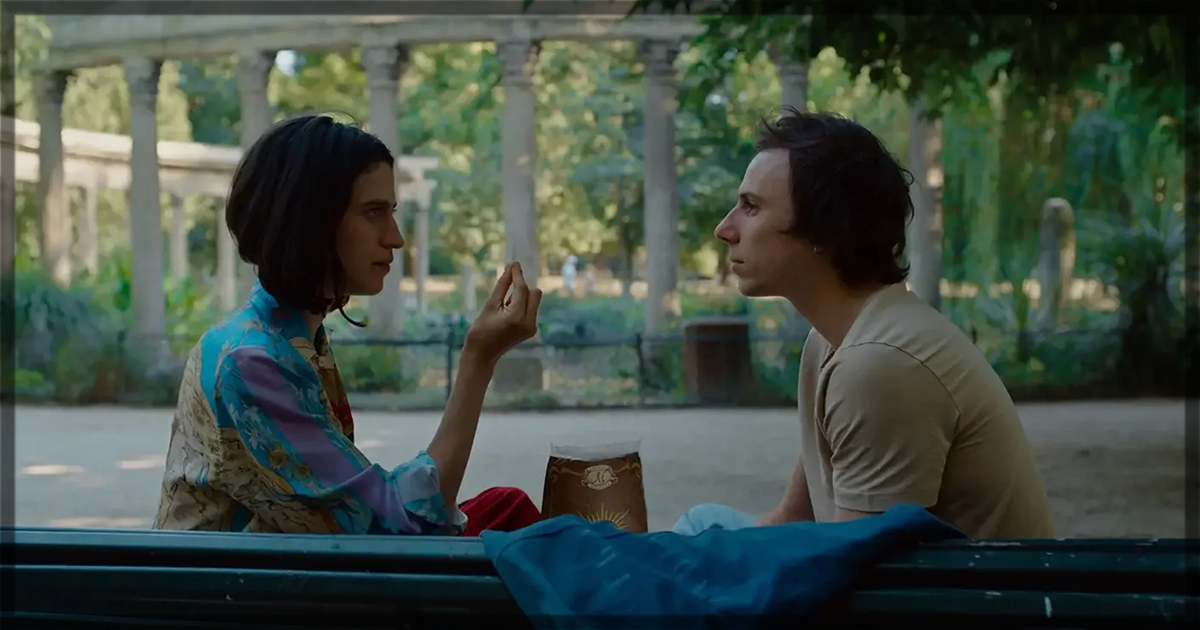The manic pixie dream girl trope, where an eccentric young woman exists solely to expand and incite growth in a male protagonist, is criticised widely for lacking dimensional fortitude. Yet it continues to be utilised as a narrative framework, and too often without insight into the girl at the heart of the trope. The titular Paulette (Marie Benati) from within Jethro Massey’s offbeat romcom Paul and Paulette Take A Bath isn’t as neutered as the more commonly known embodiments of the trope, but follows similarly gendered patterns that make her too shallow a character in her own right, making Massey’s feature debut a quite facile affair.
Paul and Paulette Take A Bath opens with a peculiar meet cute, as American photographer Paul (Jérémie Galiana) encounters 20-something Paulette at the Place de la Concorde, historically notable for being the execution spot for Marie Antoinette. This is not a coincidence for the morbidly curious Paulette. She is seen taking large strides before kneeling down at roughly the same spot Antoinette would have been beheaded, capturing Paul’s attention as she attempts to reenact Marie Antoinette’s beheading. Paul captures her photo as she kneels, the sharp click of his old-school film camera pricking Paulette’s ears up like a deer aware of a hunter. But she is no doe-eyed fawn, and commands his attention and time – an unspoken transaction for his unsolicited photography – by positioning him behind her, instructing him to cut her hair off just like Marie Antoinette, so the metaphorical guillotine could make quick work of her neck.
Paul is immediately smitten by the quirky French Paulette, whose penchant for the macabre is a refreshing change of pace to him from the affair he’s having with an older woman. Massey quickly appears to be setting Paul up as someone who enjoys a submissive sense of power, as. Paul seems to rue being more factually intelligent about France than a native speaker. While Paulette is obsessed with Antoinette, Paul is more knowledgeable about her life and death, so while he enjoys the power he is also titillated by Paulette’s brashness. After a remark about attending his exhibition, he gives Paulette his phone number and they depart from each other’s lives, the embers of their intense interaction lingering, smouldering internally.
After his exhibition fails to grasp the attention of the public, Paul sells his cameras and begins working as a realtor, working under the old flame nicknamed Goebbels – Hitler’s chief propagandist, one of his most prominent governmental roles – that he resumes an affair with. But this monotonous job cannot inspire Paul, so when Paulette calls weeks later, he relishes the chance to see her again; although the bisexual Paulette doesn’t appear to be calling for anything more than attention since the female on-off love interest Margarita (Margot Joseph) doesn’t generate the excitement that Paulette pines for.
Paul is that exciting catalyst for her. This is much to the audience’s incredulity as Paul is relatively bland as a character. This is not helped by Galiana who has the irksome insecurity of a Michael Cera/Woody Allen archetype. The two meet up a few times, before going on a road trip that visits various tourist spots which were once privy to the heinous crimes of history. This includes locations of dictators and fascists – an apartment that was once rented by Hitler – and that of the ‘human zoo‘, which paraded people of colour for spectacle in the 19th century.
Really, though, this is a tale as old as time: boy meets girl, boy tries to impress said girl by changing and adjusting to be someone they’re not. Paul and Paulette go to these locations but Paul, even as someone who loves history, isn’t as enraptured by these places. His interests lie with achieving the eventual sex that he and Paulette have, his locational choices feel less like introducing Paulette to things that will excite her, but more a means of wooing the girl in any way. For all that Massey’s script insists on not being like other scripts, it still feels oddly familiar, as the film consistently revolves around more generic ideas of drama. This is even with certain eccentricities of the characters; the aforementioned locations feature them recreating historical atrocities, while the titular bath that they take has them roleplay as Hitler and Eva Braun. This is made even slightly weirder due to Galiana and Benati having the playful chemistry of siblings – an observation made at one point due to their similar names.
Paul and Paulette Take A Bath is handsomely shot, like Massey is taking a snapshot of 2000’s Europe out of each individual frame. But these images can’t quite find justification enough for their provocation, making the comedy difficult to digest – the idiosyncratic nature of the picture makes it a marmite production already – and the drama quite stolid. Sadly, this offbeat picture can’t quite find a rhythm.
Paul and Paulette Take a Bath recently played at the Leeds Film Festival.
Learn more about Paul and Paulette take a bath at the movie’s official Instagram.


